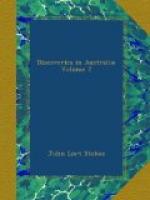HALIFAX BAY.
A party landed in the south corner of Halifax Bay, on a long flat sandy beach, which at high-water is completely covered. Crossing some small sand dunes, bound together by a sort of spinifex, we got into a luxuriant growth of grass, rich and soft, with a springing sort of feel to the feet. A few wallaby were started in this, but we obtained none; and seeing a group of rich-looking eucalypti and tea-trees, some of us bent our steps thitherwards, and found a small stream of fresh water, which filtered itself through the sand towards the beach. There was no time to trace it; but for some distance inland we could follow its course with the eye, from the luxuriant vegetation it nourished. The soil was light and sandy, covered with dense creepers, and innumerable quantities of the Angustifolia in splendid flower, many of the clusters occupying a space of three feet in diameter, with a proportionate stem of about five feet from the earth. The hum of insects, and sudden disturbance of rich-coloured parrots, screaming and fluttering through the branches, and the strong, short, rapid flight of the dove, with its melancholy cooing, transported us in imagination a long way inland, whereas we were not three hundred yards from the beach. We now wended our way towards a small eminence, through long grass, in most places interwoven with creepers, compelling us to tear our way through them in the ascent.
ASTONISH A NATIVE.
In doing so Mr. Bynoe flushed a native; but before the rest of the party could come up, he had taken to flight. The simultaneous cries of “here’s a native!” “where!” “here!” “there he goes stark naked,” rose; and before ALL EYES could catch a glimpse, his dark figure insensibly blended with the waving branches of his wild solitude, and without a cry of fear or joy, he was lost to us, perhaps for ever! We burst through the same brushwood he had recently thrown aside, and entered a labyrinth of forest trees, without finding a clue to the direction he had taken.
The whole of the country appeared to be granitic; the eminence on which we stood bore that character, and some parts, near the beach, were thrown into massive blocks, at high-water, completely surrounded by the flux of tide. The view inland was intercepted by hills and trees, the former assuming the same appearance as the one we were on, but higher. Our game-bag was thinly lined with small curlews, oyster-catchers, and sanderlings.
A sandy spit connects Magnetical Island on the south side with the main, and must be sufficiently shoal at low water to allow the natives to ford over; for we found no canoes with those we met on the island, who were numerous and apparently very well disposed. Although not a large race, they were in very good condition; part of their food, is the native yam, called warran in Western Australia. The birds on the island are common to other parts; and the wallaby, of which Mr. Bynoe shot three, are light coloured.




